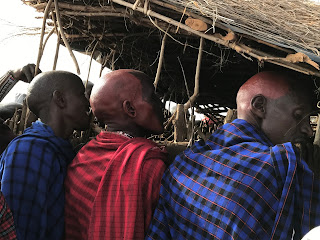After our meeting we drive the short distance across the dry plains to the ceremony site, passing giraffe and zebra on route. A sea of red. Maasai in all directions. I am one of two Mazungus (white people) at the ceremony. Funny how I note that isn't it? It never really strikes me to be honest. I suppose on a special day like this it makes me realize how very fortunate I am to witness this and other events like this, and that it is not a tourist event, otherwise there would be floods of safari vehicles, mazungus and cameras.
The ceremony is called Enkang e-kule. Maasai warriors to this date have not eaten any meals with their wives or in front of their mothers. Today their mother shaves their head, they paint it red and prepare to eat for the first time with their wives. The cows that were slaughtered in the early morning are in the centre of the manyatta (the circular compound). Mzee sit in the middle, tending to the fire and the meat while sipping home brew, potent stuff.
I am allowed in the center area and am offered a piece of meat. Of course I say yes with a huge grin. Now, the Maasai usually char their meat, but today for some reason it is blood red. I take the huge hunk of bloody meat and tear off a piece with my teeth. They all watch of course and as I gnaw on the meat I smile, trying to envision something else in my mouth.I keep the rest of the piece in my hand so that for the next hour, when I am offered more meat, I can point to the hunk in my hand, as if to say, I already have some, thank you.
When we arrive the warriors are in one line and their wives in another. They are smiling, chatting and anxious. When they are called by an elder who has clearly had too much hoe brew, they enter a small hut together. Inside the wife feeds the man a piece of meat. The man then feeds his wife a piece of meat and then she feeds him another piece. This signifies his 'graduation' to being a junior elder. They exit the hut with large smiles on their face. There are over 150 men going through the ritual.
Maasai outside the hut, peaking in, to watch the warriors being fed by their wives.
A warrior asks me if I want to go into the hut, to see. I thank him but already feel as if I am intruding on a precious time. Imagine your wedding and people you really do not know, come and they take pictures, and they witness your day, and sit at the head table with you, eat your cake. Its strange.
After all the warriors has gone into the hut with their wives and been fed, they gather together for song and dance. The guttural rhythm, the high pitched yelps, the fluid movement. I am so fortunate to have heard and seen Maasai singing and dancing, but on this day I say to myself 'drink this in, absorb it, relish it.' An ancient culture facing a changing world.
They all leave the compound and line up again in two lines, male and female. It sounds like wind chimes from the metal jewlery clanging as they walk and stand in the breeze. The Wazee, the really old Maasai, wait at the entrance and as the Maasai enter, they smear goat fat onto their heads as a blessing.
The man in black is an elder, the fat is in the gourd. Note the Maasai with the selfie stick in the back, classic display of ancient tradition blended with modernity.
They then all get on their knees and the elders pray for them. The elders walk through the kneeling group and spray them with milk as a final blessing.
After the final blessing there is more song and dance. One of the warriors sits on the ground. He is shaking in a fit. I ask my colleague if he is ok. He is emotional, he is no longer a warrior, he has graduated to be a junior elder, with responsibility and no turning back. He is overcome with emotion that he is unable to handle.
We bid farewell to the Maasai we know, congratulate them and thank them. We thank them for giving us the privilege to witness their ceremony, their tradition. The drive back to the lodge is quiet. We are covered in Amboseli dust. Without words, relishing the afternoon, the fortune of being here, this day. The next ceremony of this kind for this Maasai clan will be in 10 years. I wonder how different it will be, if the numbers will have dwindled and if the youth will still embrace this rite of passage.






